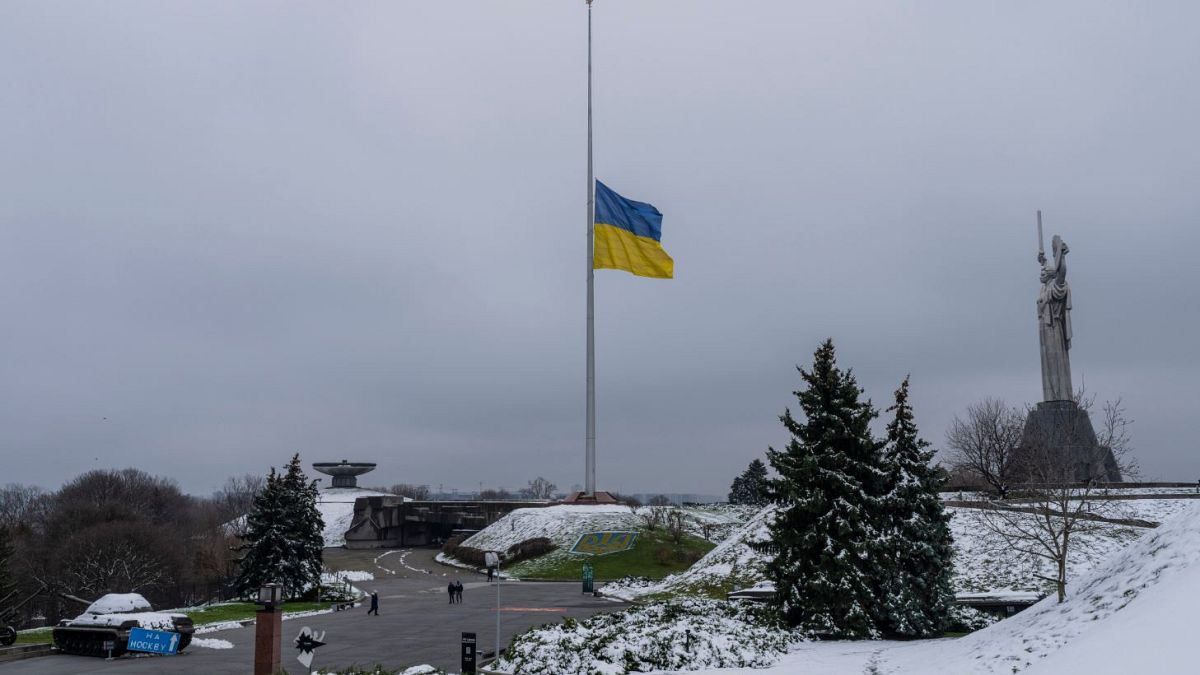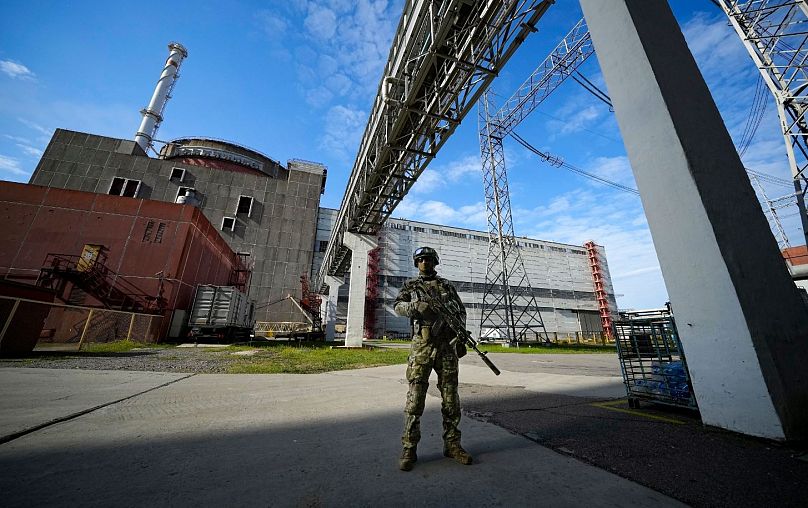Here is our summary of the latest news around Russia's war in Ukraine.
1. 'Barbaric' Russian strikes on Ukraine 'will not work,' says Blinken
The US Secretary of State Antony Blinken has denounced Russia's "barbaric" strikes against civilian infrastructure in Ukraine.
Blinken said on Wednesday that Russian President Vladimir Putin had focused his "fire and ire" on Ukraine's civilian population but would not divide them.
The US Secretary of State was speaking after a two-day NATO meeting in Bucharest.
"Russia has bombed more than a third of Ukraine's energy system, leaving millions of people in the cold and dark," Blinken told a news conference.
"Heat, water, electricity ... these are President Putin's new targets, he's hitting them hard. This brutalisation of Ukraine's people is barbaric."
"This strategy has not, and will not, work. We will continue to prove him wrong."
Russia has carried out huge attacks on Ukraine's energy infrastructure in recent weeks, leaving millions of people without heating and power amid sub-zero temperatures. Kyiv has labelled the strikes as a "war crime".
Russia has denied targeting Ukrainian civilians and has blamed the attacks on Kyiv's failure to negotiate a peace deal.
The United States has concentrated their attention on supporting Ukraine's energy resilience.
Blinken's comments came after former Russian President Dmitry Medvedev warned NATO against providing Ukraine with Patriot missile defence systems.
Kyiv has asked its Western partners for air defences, including US-made Patriot systems, to protect it from Russian attacks on its energy infrastructure.
NATO Secretary-General Jens Stoltenberg has confirmed that deliveries of sophisticated surface-to-air missile systems are being considered by some allies.
2. Several killed in fires after latest Russian strikes - Ukrainian officials
Several people have been killed by fires after Russian strikes on Ukraine's power infrastructure, authorities say.
Ukraine’s state emergency service said there had been more than 130 fires in the last 24 hours, with many people resorting to emergency generators and gas cylinders.
Power outages have led to a surge in accidents “due to the violation of fire safety rules”, the service said.
Nine people are so far reported to have died, with at least eight others injured.
Ukrainian officials have also reported the deaths of two people after Russian shells hit a hospital in the northern Sumy region and a residential building in the southern city of Kherson.
Five Ukrainian civilians were killed by Russian forces on Tuesday, according to a senior government official.
Russian forces pulled back from Kherson earlier this month but have dug in on the eastern bank of the Dnipro river and have continued to carry out missile strikes in the area.
Many Russian soldiers have moved from Kherson to the eastern Donetsk region, where Moscow claims it has captured two Ukrainian villages near Bakhmut.
The city -- which has been partially destroyed by missile strikes -- remains under Kyiv's control amid intense fighting.
The US-based Institute for the Study of War says that Russian advances in the Donetsk region are "marginal".
Meanwhile, the governor of the Russian region of Bryansk has reported that a fuel depot was on fire.
The blaze broke out around 150 kilometres from the border with Ukraine. No casualties have so far been reported.
"Teams of firefighters and rescue workers are on the scene," governor Alexander Bogomaz wrote on Telegram.
Ukrainian shells have previously struck Russian oil depots in the region, causing major power outages.
3. Ukrainian engineer appointed new director of Zaporizhzhia plant
The chief engineer of the Zaporizhzhia nuclear power plant has agreed to become the new director of the site.
Ukrainian Yuri Chernichuk said it was the "only possible and correct decision" to run Europe's largest nuclear facility, which is not producing electricity but is still run by its Ukrainian staff to keep it safe.
His appointment was confirmed by Rosenergoatom, the Russian nuclear power operator at the plant.
The Zaporizhzhia site has been occupied by Russian forces since March, while the region is one of the four that Moscow annexed in September.
Moscow said in October it was putting the plant under Russian control, a move the Ukrainian government says is illegal.
Both Ukraine and Russia have accused each other of shelling near the facility, prompting fears of a nuclear disaster.
The UN's International Atomic Energy Agency (IAEA) has repeatedly condemned the "unacceptable" missile strikes near the plant.
"We have done and are doing the possible and the impossible to ensure that the world does not experience new [accidents] Fukushima and Chernobyl," Chernichuk said in the statement.
According to Kyiv, Russia has positioned 500 soldiers at the Zaporizhzhia plant.
Ukraine had also accused Russian authorities of abducting the previous director of the facility, Ihor Murashov, before releasing him.
4. EU proposes UN-backed court to investigate Russian war crimes
European Commission President Ursula von der Leyen has suggested setting up a UN-backed specialised court to investigate possible war crimes committed by Russia in Ukraine.
von der Leyen said on Wednesday that the bloc would also continue to support the work of the International Criminal Court (ICC).
Ukraine has been pushing for the creation of a special court to prosecute Russian military and political leaders. Moscow has always denied the allegations of war crimes.
The Hague-based ICC has already launched probes into suspected war crimes in Ukraine but it does not have the authority to prosecute.
Von der Leyen also stated that the EU wants to use frozen Russian assets to repair an estimated €600 billion worth of damage in Ukraine.
The bloc has currently sanctioned around €300 billion of Russian central bank reserves and €19 billion of Russian oligarchs' money.
Many assets of blacklisted Russian citizens are difficult to seize or even freeze because they are registered abroad to family members.
"We will work on an international agreement with our partners to make this possible. And together, we can find legal ways to get to it," von der Leyen said on Wednesday.
The EU said the restrictions on Russian assets could be lifted if a peace deal between Ukraine and Russia settled the question of damages reparation.
5. Concerns grow over Russian influence on neighbours
At Wednesday's meeting in Romania, NATO diplomats also focused on Russia's influence over its neighbours and in the western Balkans.
The foreign ministers of Bosnia, Georgia and Moldova met with their NATO counterparts to discuss ways that the alliance may be able to support them through political, energy and territorial uncertainty.
Dutch Foreign Minister Wopke Hoekstra said the meeting is aimed at ensuring “more safety and security on the European continent.”
"It is a signal on how important it is to create stability not only for NATO countries itself but also beyond," he added.
Bosnia has witnessed a number of recent protests following regional elections won by the pro-Russian Bosnian Serb leader.
Bosnian Foreign Minister Bisera Turkovic said her country “is very concerned about the future.”
"We have Russian proxies in our government and division in our country is deep," she said.
NATO has promised Georgia that -- like Ukraine -- it will one day join the 30-nation alliance, although a breakaway Georgian region has this year threatened to hold a referendum on joining Russia.
Russia’s war in Ukraine has impacted Moldova, which is currently facing a severe energy crisis due to its reliance on Russian energy.
In recent weeks, Moldova has suffered massive power outages after Russian strikes on Ukraine’s energy grid. Blasts have also occurred in the country’s Russian-backed breakaway region of Transnistria — where Moscow bases around 1,500 troops.
NATO members have previously called on the alliance to ensure that Russia could not destabilise other countries and "dictate security options".
"The stability in western Balkans is important for peace. We need to stop the Russians in the western Balkans, we need more Europe," said Italian foreign minister Antonio Tajani.
"We need to protect all the countries in the western Balkans and close to Ukraine because it is important at this moment to work together. Unity is important and it's a strong message to Russia."
6. Odesa council votes to remove Catherine the Great statue
Authorities in the Ukrainian Black Sea port of Odesa have voted to remove a statue of Empress Catherine the Great of Russia.
The monument to the city's founder will be relocated, Odesa city council said on Wednesday.
The statue towers over a central square but has been repeatedly vandalised with red paint following Russia's invasion.
A small majority of Odesa residents had already voted in an online poll to remove the monument.
Catherine the Great -- who served as empress of Russia from 1762 to 1796 -- founded Odesa in the late 18th century and the city became a strategic point for the former Soviet Union.
The empress' statue had previously been dismantled in 1920 under Soviet rule but was restored by Ukrainian authorities in 2007.
Since Moscow's invasion, Ukrainian authorities have been removing monuments and renamed some streets linked with Russia.
Local Odesa lawmakers had also voted to remove and relocate a monument to an 18th-century Russian general, Alexander Suvorov.

